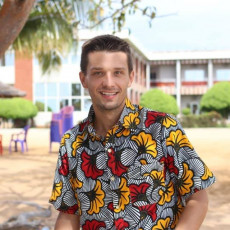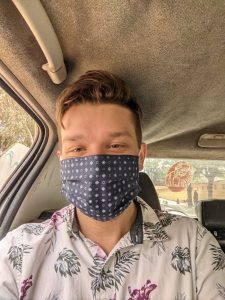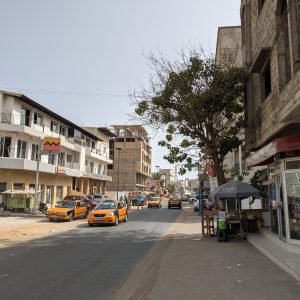Stepping out of the airport in Dakar, Senegal, a familiar, if not surreal, sensation washes over me as it hits that I am once again in West Africa. Coming out of a year and a half of isolation and virtual classes the feeling is all at once comforting and overwhelming. The moment quickly fades as I step back into the rhythm of life, trying to get phone credit and haggling with taxi drivers.
I inform Fatimata “Neene” Sy, one of my Senegalese counterparts, of my arrival and she quickly calls to inform me that she has a family matter to tend to and will not be able to greet me when I arrive at her place. Still worried about me, I assure her that I will arrive just fine—hospitality is an important part of Senegalese culture so I know this matter is important and I don’t want to add to her stress.
As I look out of the window of the taxi, I am again swept up into the familiar scenes and smells of street vendors cooking spiced dibi (West African dish of spiced meat and caramelized onions), people selling peanuts and other items to slow-moving traffic, and livestock calling out from the side of the road. Traffic moves slowly in Dakar, inching its way to the end of Cape Verde Peninsula, towards downtown.
Eventually I arrive at my destination. I quickly settle in and orient myself to my new neighborhood; identifying the nearby boutiques (corner stores), scoping out restaurants, and introducing myself to my neighbors. Speaking French and Pular, I befriend some local merchants who help familiarize me with local prices and taxi routes. It becomes immediately evident that I will have to work on improving my Wolof skills, the lingua franca throughout most of Senegal.
As the Maghrib call to prayer marks the end of the day, I begin to reflect on my presence here and the unique challenges I will likely face connecting with returned migrants. While life continues on the surface, covid-19 leaves its traces in the masks people wear and the lack of physical greetings such as handshakes and cheek kisses that were so ubiquitous before.
Its tracks run deeper, no doubt, and I wonder how I will engage with the community and what building a social network in the midst of a pandemic will look like here. The welcoming and friendly atmosphere that defines Senegal has not disappeared but these new realities have changed the way in which people relate to one another. Despite this, my contacts seem excited and optimistic for my arrival, which gives me confidence.
Posted By Jeremiah Gatlin
Posted Jun 3rd, 2021




1 Comment
Iain Guest
June 20, 2021
Welcome back, Jeremiah! It’s clear from this blog that you like West Africa and that the feeling is mutual!! You write with the familiarity of an old friend who appreciates the local culture and this will stand you in good stead as you take a dive into the sensitive issue of migration. We’d be interested to know more about COVID in Senegal – why it seems less serious than other countries where we work – Kenya and Uganda, whether vaccines are arriving etc. And please continue to let us know if you see any ways in which the pandemic is affecting Senegal life and culture. But most of all we look forward to your insights into the migration challenge. Have a great fellowship!